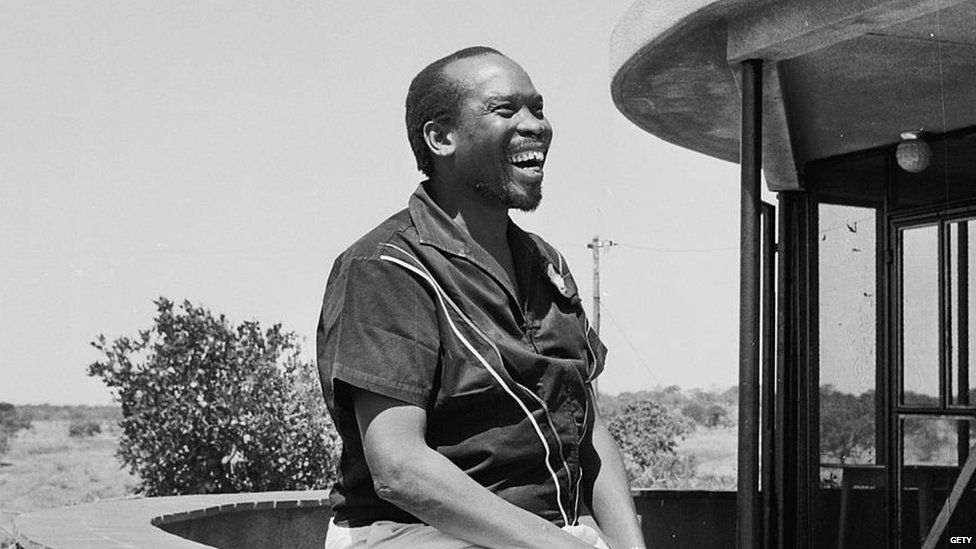Botswana: From dusty bowl to sparkling success story
-
Published

When Charles King of the Southern Africa News Service reported on Botswana's independence in September 1966, he described the country as a "vast, trackless wasteland" with little to celebrate.
Two years of drought and crop failure had brought "havoc and hunger to its widely scattered agriculture inhabitants" he wrote, adding that the newly-formed country had little hope of economic stability.
At the time, in a country the size of France, there were only 12 kilometres (seven miles) of paved roads, few hospitals and most people depended on cattle and subsistence farming for an income.
Five decades on and Botswana is regularly hailed as an Africa success story. The UN's development agency, the UNDP, describes Botswana as "one of Africa's veritable economic and human development success stories".
Natural charm
This is evident on arriving in Gaborone, Botswana's capital. The streets are clean and orderly, the traffic - such as it is - flows easily and modern glass buildings - sensible, orderly structures - gleam against a usually clear blue sky.
Unlike the tortured post-colonial chaos of so many African capitals, things work here - and they work well.
Greg Mills of the Brenthurst Foundation, an independent economic think-tank in Johannesburg, says the transformation is "down to long-term vision, stable politics and prudent government".
And, he might have added, luck.
Botswana is blessed by two great pieces of fortune - huge diamond deposits and vast pristine areas of wilderness where big cats roam free and which are home to more elephants than anywhere else in the world.
Both have helped the country's per capita wealth jump more than 100-fold in 50 years.
Diamond mining giant De Beers was already prospecting in the country when in 1969 it announced it had found significant diamond-bearing rock formations. By the 1980s, Botswana was the world's largest producer of gem diamonds.
Wise stewardship by Botswana's leaders has seen the country avoid the "resource curse" where mineral wealth has been squandered, as in Nigeria and elsewhere.
Kebapetse Lotshwao, politics lecturer at the University of Botswana, says the first four decades of independence have been especially successful. "The country was lucky to have leaders such as Seretse Khama and Ketumile Masire [Botswana's first two presidents]," he says.
The pair put development above everything else. Using international development aid and growing diamond revenues, they invested heavily in social services such as health and education.
This saw poverty drop (although a fifth of the population is still below the poverty line) while health and literacy rates are high and attendance at primary school up to age 13 is nearly 90%. Many children also go on to high school.
Today though, some worry that Botswana has hit a plateau. Unemployment is stubbornly high at nearly 20% and little progress has been made on diversifying the country's economy away from diamonds and tourism.
Furthermore, the country's Aids epidemic inflicts a heavy toll while the recent drought in southern Africa has badly afflicted the many who are subsistence farmers.
But there are other issues bubbling away that are tarnishing Botswana's reputation.
Cronyism
The Botswana Democratic Party (BDP), which has ruled since independence, is losing its popularity. Political discontent is on the rise and, critics say, the government is becoming more authoritarian. Journalists who investigate corruption have been detained and harassed.
A report by Freedom House, a US democracy rights group, also reports that there is more than a whiff of cronyism.
"There are almost no restrictions on the private business activities of public servants (including the president, who is a large stakeholder in the tourism sector) and political ties often play a role in awarding government jobs and tenders," it says.
Mr Lotshwao says the government has "failed to evenly distribute the fruits of development and economic growth".
"There is a need to find a way of closing the gap between the rich and the poor," he argues.
"As things stand, this is not good in the long run as the losers could become dejected, a situation that can lead to political instability."
Mr Lotshwao argues that the country needs political reform to distribute power away from President Ian Khama, the son of Botswana's first post-independence leader.
Consensus politics
"Botswana's democracy has not progressed over the years," he says.
"It still uses an imperial constitution imposed by Britain at independence. The president is empowered to rule as he sees fit."
As for the economy, Mr Mills says Botswana "must diversify".
"It must benchmark against and be more competitive than South Africa in services from airports to airlines, telecoms and banking costs."
As economist Michael Lewin has pointed out in a World Bank report, there is a Tswana tradition called kgotla, where members of the community sit and talk for hours until a problem is solved.
The end of Botswana's glittering diamond wealth may be on the horizon, but the old ways of kgotla may find a path to further success for the 21st Century.
Problems have emerged, but consensus has been the Botswana way of government since long before independence. It is possible that its people today will be able to find a way out of their growing dilemmas.
-
-
Published2 September 2016
-
-
-
Published3 July 2023
-